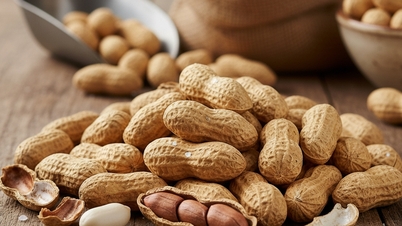A study published in Nature Communications suggests that meal timing may influence the risk of heart disease.

Research shows that eating breakfast and dinner earlier can help reduce the risk of heart disease - Illustration photo
Eating breakfast after 9 a.m. and dinner after 9 p.m. may increase the risk of cardiovascular disease, especially in women.
"The study points to a link between cardiovascular health and meal timing," explains Dr. Bernard Srour, one of the study's authors. "Many previous studies have found a possible link between skipping breakfast and poorer metabolic health. But little is known about the link between meal timing and cardiovascular disease."
The study collected data from 103,000 adults, mostly women, and tracked participants' health habits since 2009. The team then analyzed 5.7 days of 24-hour food diaries from the subjects over a period of 7.2 years. The results showed:
- Every hour you delay your first meal of the day is associated with a higher risk of cardiovascular disease. Every hour you delay your last meal of the day has a similar effect.
- People who eat their last meal after 9pm have a 28% higher risk of cerebrovascular disease than those who eat before 8pm.
How does meal timing affect heart health?
According to Srour, the link between meal timing and heart health involves the interaction between eating and the biological clock.
“Meal timing can regulate the body clock, which is involved in a number of biological functions such as blood pressure regulation, metabolism, and hormone secretion,” he said. These factors are all important for heart health.
For example, the body's natural circadian rhythm has a strong influence on insulin sensitivity - the body's ability to use sugar from food. Previous studies have found that the body is more sensitive to insulin in the morning than in the evening.
This reduced sensitivity leads to insulin resistance, which can lead to cardiometabolic disorders such as inflammation, endothelial dysfunction, and hypertension, each of which increases the risk of heart disease.
"By delaying breakfast, people may be setting themselves up for poor insulin response and thus jeopardizing cardiovascular health," Bhupendar Tayal, MD, cardiologist and assistant professor of medicine at Case Western Reserve University, told Health magazine.
Additionally, eating late in the evening, when melatonin (the sleep hormone) peaks, can hamper the body's metabolism, says Srour.
A 2020 study found that compared with eating early in the evening, eating late at night is more likely to lead to weight gain and fat metabolism disorders.
Since obesity is closely linked to heart disease, it's no surprise that this factor can increase your risk of heart disease.

Eating healthy is an effective way to protect your health - Illustration photo
What is the optimal meal time for heart health?
There is no set rule for meal timing that works for everyone, but Mr Srour says his research suggests some eating patterns may be better for the heart than others.
“Our research suggests that eating early in the morning and ending meals early in the evening may be beneficial by ensuring a sufficiently long overnight fast,” he said.
However, he also stressed that although this model may be optimal for cardiovascular health, more research is needed to determine the results.
Eating regularly is also important, says Tayal. “Skipping meals, especially breakfast, is not recommended as it can lead to obesity,” he says.
He also said eating late at night is linked to higher rates of obesity, which increases the risk of heart disease.
“Late in the evening, the body's metabolism slows down due to increased melatonin levels,” he explains. “In my opinion, the ideal time to eat is an early breakfast (to match each person's wake-up time) and dinner should be finished at least three hours before bedtime.”
How to eat healthy with your heart?
In addition to adjusting your meal timing, paying attention to what you eat is also important to protect your heart health. According to Tayal, a diet rich in fruits, vegetables, whole grains, nuts, and fish (such as the Mediterranean or DASH diet) is best for supporting heart health.
“Avoiding foods high in sodium and cutting down on alcohol consumption is also important,” he adds.
The American Heart Association's recommendations are similar, emphasizing minimally processed foods, limited sugar, low-fat dairy, whole grains, healthy proteins, and plenty of fruits and vegetables.
Even if you sometimes have a late breakfast or a late dinner, maintaining a healthy diet with the above foods will help you protect your heart health better.
 Does keeping a food diary help you lose weight?
Does keeping a food diary help you lose weight?Source: https://tuoitre.vn/an-sang-va-toi-som-co-the-giam-nguy-co-mac-benh-tim-20250219082349025.htm



![[Photo] Lam Dong: Panoramic view of Lien Khuong waterfall rolling like never before](/_next/image?url=https%3A%2F%2Fvphoto.vietnam.vn%2Fthumb%2F1200x675%2Fvietnam%2Fresource%2FIMAGE%2F2025%2F11%2F20%2F1763633331783_lk7-jpg.webp&w=3840&q=75)
![[Photo] President Luong Cuong receives President of the Senate of the Czech Republic Milos Vystrcil](/_next/image?url=https%3A%2F%2Fvphoto.vietnam.vn%2Fthumb%2F1200x675%2Fvietnam%2Fresource%2FIMAGE%2F2025%2F11%2F20%2F1763629737266_ndo_br_1-jpg.webp&w=3840&q=75)
![[Photo] National Assembly Chairman Tran Thanh Man holds talks with South Korean National Assembly Chairman Woo Won Shik](/_next/image?url=https%3A%2F%2Fvphoto.vietnam.vn%2Fthumb%2F1200x675%2Fvietnam%2Fresource%2FIMAGE%2F2025%2F11%2F20%2F1763629724919_hq-5175-jpg.webp&w=3840&q=75)








































































































Comment (0)